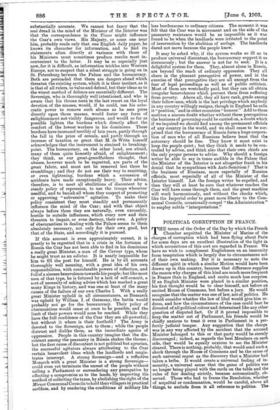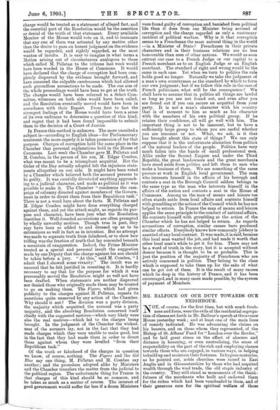POLITICAL CORRUPTION IN FRANCE. T HE terms of the Order of
the Day by which the French Chamber acquitted the Minister of Marine of the charges of corruption which had been flying about Paris for some days are an excellent illustration of the light in which accusations of this sort are regarded in France. We have no wish to compliment Englishmen on an immunity from temptation which is largely due to circumstances not of their own making. But it is necessary to note the different spirit in which a similar Motion would have been drawn up in this country, because that difference supplies the reason why charges of this kind are much more frequent in France than in England, and excite much less surprise. If an English Minister were placed in a similar position, his first thought would be to clear himself, not before an excited House of Commons, but before a jury. He would recognise that the matter was one of law, not of politics. He would consider whether the law of libel would give him re- dress, and how the circumstances of the case could best be divested of all political colour and determined like any other question of disputed fact. Or if it proved impossible to keep the matter out of Parliament, his friends would be chiefly .anxious to treat it even in Parliament in a per- fectly judicial temper. Any suggestion that the charge was in any way affected by the accident that the accused Minister belonged to this or that party would be sternly discouraged; indeed, as regards the best Members on each side, they would be equally anxious to see the Minister cleared. There is nothing, probably, that would send such a shock through the House of Commons and be the cause of such universal regret as the discovery that a Minister had taken a bribe. It would create a universal feeling of in- security, a universal sense that the game of politics was no longer being played with the cards on the table and the rules of fair dealing strictly, because automatically, ob- served. Those who had to frame the Resolution, whether of acquittal or condemnation, would be careful, above all things, to exclude from it all reference to polities. The charge would be treated as a statement of alleged fact, and the essential part of the Resolution would be the assertion or denial of the truth of that statement. Every available Member of the House would vote on it, and to insinuate that any one of them was actuated by any motive other than the desire to pass an honest judgment on the evidence would be regarded, and rightly regarded, as the most wanton of insults. It is easy to imagine in what terms a Motion arising out of circumstances analogous to those which called M. Pelletan to the tribune last week would have been worded in the House of Commons. It would have declared that the charge of corruption had been com- pletely disproved by the evidence brought forward, and have censured the culpable carelessness which had allowed such groundless accusations to be made. The one aim of the whole proceedings would have been to get at the truth. The charges would have been referred to a Select Com- inittee, witnesses on both sides would have been called, and the Resolution eventually moved would have been in accordance with their Report. From first to last the strongest feelings of the House would have been a sense of its own unfitness to determine a question of this kind, and regret that it had been found impossible to submit them to the decision of a Court of Justice.
In France this method is unknown. The more unsuited a subject is—according to English ideas—for Parliamentary treatment the more eagerly it is taken possession of for that purpose. Charges of corruption hold the same place in the Chamber that personal explanations hold in the House of Commons. Last week the Chamber gave M. Pelletan and M. Combos, in the person of his son, M. Edgar Combes, what was meant to be a triumphant acquittal. But the Order of the Day actually adopted left the injurious state- ments altogether on one side. It might have been voted by a Chamber which believed both the accused persons to be guilty. It was carefully divested of anything approach- ing to a judicial character, and made as political as it was possible to make it. The Chamber " condemns the cam- paign of calumny directed against members of the Govern- ment in order to divert them from their Republican task." There is not a word here about the facts. M. Pelletan and M. Edgar Combes might have done everything charged against them, and yet the attack might, as regards its pur- pose and character, have been just what the Resolution describes it. Well-founded accusations are often prompted by wholly unworthy motives. Though true in part, they may have been so added to and dressed up as to be calumnious as well in fact as in intention. But no attempt was made to separate truth from falsehood, or to show how trifling was the fraction of truth that lay concealed beneath a mountain of exaggeration. Indeed, the Prime Minister treated as a special and personal insult the suggestion made by one Deputy that the charge against his son should be taken before a Jury. " At this," said M. Combes, " I admit that I showed some vivacity." The insult was so unusual that he felt justified in resenting it. It is hardly necessary to say that for the purpose for which it was presumably moved the Resolution might as well not have been drafted. When statements are neither disproved nor denied those who originally made them may be trusted to go on making them. The Figaro, which had given publicity to the charges against M. Pelletan, repeats its assertions quite unmoved by any action of the Chamber. Why should it not? The division was a party division, the majority which acquitted the accused was a party majority, and the absolving Resolution concerned itself chiefly with the suggested motives—which very likely were also the real motives—which led to the charges being brought. In the judgment of the Chamber the wicked- ness of the accusers lay, not in the fact that they had made charges which they were unable to make good, but in the fact that they had made them in order to divert those against whom they were levelled "from their Republican task."
Of the truth or falsehood of the charges in question we know, of course, nothing. The Figaro and the Gil Bias say one thing, M. Pelletan and M. Combes say another; and the procedure adopted alike by Ministers and the Chamber transfers the matter from the judicial to the political region. The unfortunate thing for France is that charges of this kind should be so common, and be taken so much as a matter of course. The interest of good government would suffer far less if a dozen Ministers were found guilty of corruption and banished from political life than it does from one Minister being accused of corruption and the charge regarded as only a customary incident of political warfare. Why is it that corruption seems to a Frenchman the most natural thing in the world —in a Minister of State ? Frenchmen in their private characters and in their business relations are no less honourable than men of other nations. We would as soon entrust our case to a French Judge or our capital to a French merchant as to an English Judge or an English merchant. The standard of right and wrong would be the same in each case. Yet when we turn to politics the rule holds good no longer. Naturally we take the judgment of a man's own countrymen as the standard by which to form our own judgment; but if we follow this rule in the case of French politicians, what will be the consequence ? We shall have to assume that in politics all things are lawful so long as you are not found out, and even after you are found out if you can secure an acquittal from your party. It is not a man's character with his country that is of moment to him so much as his character with the members of his own political group. If he retains their confidence, all will go well with him. The important thing is not to be innocent, but to have a, sufficiently large group to whom you are useful whether you are innocent or not. What, we ask, is it that has brought about this state of things ? We can only suppose that it is the unfortunate alienation from politics of the natural leaders of the people. Politics have very much fallen into the hands of small professional men. Alike under the Second Empire and under the Third. Republic, the great landowners and the great merchant' have stood aside from politics and left them to men who make a business of them. We see something of the same process at work in English local government. The man who interests himself in the affairs of his borough and contests a seat in the Borough Council seldom belongs to the same type as the man who interests himself in the affairs of the nation and contests a seat in the House of Commons. Among us the man of means and leisure too often stands aside from local affairs and contents himself with grumbling at the action of the Council which he has not helped to return. In France the man of means and leisure applies the same principle to the conduct of national affairs. He contents himself with grumbling at the action of the Chamber which he has not helped to return. As regards accusations of corruption, similar causes have produced similar effects. Everybody knows how commonly jobbery is asserted of any local contract. It was made, it is said, because this local man wanted the job, and had made it worth that other local man's while to get it for him. There may not be a word of truth in the story, but it is accepted without demur because it is thought to be so probable. This is just the position of the majority of Frenchmen who are actively concerned in politics. They belong to the class which is supposed to take them up for the sake of what' can be got out of them. It is the result of many causes which lie deep in the history of France, and it has been encouraged, and in many cases made possible, by the system of payment of Members.











































 Previous page
Previous page